

Alexander Pearce. Alexander Pearce (1790 – 19 July 1824) was an Irish convict who was transported to Van Diemen's Land for seven years for theft.
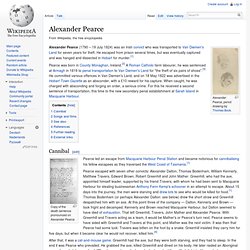
He escaped from prison several times, but was eventually captured and was hanged and dissected in Hobart for murder.[1] Pearce was born in County Monaghan, Ireland.[2] A Roman Catholic farm labourer, he was sentenced at Armagh in 1819 to penal transportation to Van Diemen's Land for "the theft of six pairs of shoes".[3] He committed various offences in Van Diemen's Land, and on 18 May 1822 was advertised in the Hobart Town Gazette as an absconder, with a £10 reward for his capture. When caught, he was charged with absconding and forging an order, a serious crime. For this he received a second sentence of transportation, this time to the new secondary penal establishment at Sarah Island in Macquarie Harbour. Cannibal[edit] Copy of the death sentence pronounced on Alexander Pearce After that, it was a cat-and-mouse game. There are inconsistencies in Pearce's story.
Androphagi. Androphagi (Ancient Greek : "Ἀνδροφάγοι" for "man-eaters") was an ancient nation of cannibals north of Scythia (according to Herodotus), probably in the forests between the upper waters of the Dnepr and Don.
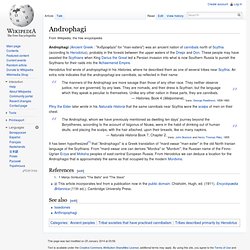
These people may have assisted the Scythians when King Darius the Great led a Persian invasion into what is now Southern Russia to punish the Scythians for their raids into the Achaemenid Empire. Herodotus first wrote of andropophagi in his Histories, where he described them as one of several tribes near Scythia. An extra note indicates that the andropophagi are cannibals, as reflected in their name: Pliny the Elder later wrote in his Naturalis Historia that the same cannibals near Scythia wore the scalps of men on their chest. References[edit] Jump up ^ Marija Gimbutas's "The Balts" and "The Slavs" This article incorporates text from a publication now in the public domain: Chisholm, Hugh, ed. (1911).
See also[edit] Kuru (disease) Kuru is an incurable degenerative neurological disorder endemic to tribal regions of Papua New Guinea.
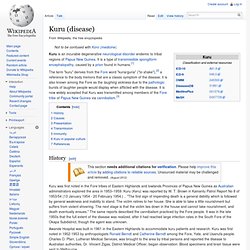
It is a type of transmissible spongiform encephalopathy, caused by a prion found in humans.[1] Fore people. The Fore live in the Okapa District of the Eastern Highlands Province, Papua New Guinea.
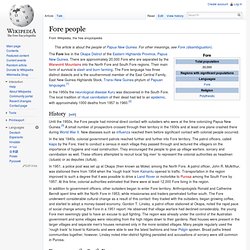
There are approximately 20,000 Fore who are separated by the Wanevinti Mountains into the North Fore and South Fore regions. Their main form of survival is slash and burn farming. The Fore language has three distinct dialects and is the southernmost member of the East Central Family, East New Guinea Highlands Stock, Trans–New Guinea phylum of Papuan languages.[1] History[edit] Until the 1950s, the Fore people had minimal direct contact with outsiders who were at the time colonizing Papua New Guinea.[3] A small number of prospectors crossed through their territory in the 1930s and at least one plane crashed there during World War II.
In the late 1940s, colonial government patrols reached further and further into Fore territory. In 1951, a police post was set up at Okapa (then known as Moke) among the North Fore. In addition to government officers, other outsiders began to enter Fore territory. Cannibalism. The Carib tribe in the Lesser Antilles, from whom the word cannibalism derives, acquired a long-standing reputation as cannibals following the recording of their legends in the 17th century.[3] Some controversy exists over the accuracy of these legends and the prevalence of actual cannibalism in the culture.
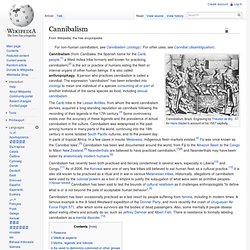
Cannibalism was widespread in the past among humans in many parts of the world, continuing into the 19th century in some isolated South Pacific cultures, and to the present day in parts of tropical Africa. In a few cases in insular Melanesia, indigenous flesh-markets existed.[4] Fiji was once known as the 'Cannibal Isles'.[5] Cannibalism has been well documented around the world, from Fiji to the Amazon Basin to the Congo to Māori New Zealand.[6] Neanderthals are believed to have practiced cannibalism,[7][8] and Neanderthals may have been eaten by anatomically modern humans.[9] Reasons In some societies, especially tribal societies, cannibalism is a cultural norm. Medical aspects St.